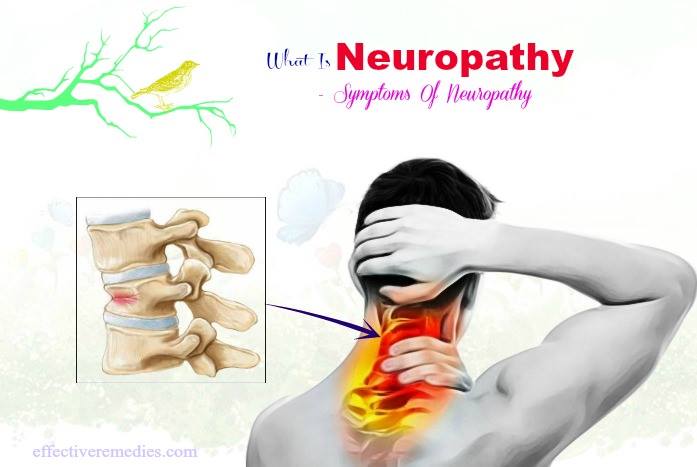Contents
Neuropathy is a health issue that affects the patient's life a lot. If you are concerning this issue, reading this article is a good choice. Today, Effective Remedies, will introduce you information on neuropathy, including what is neuropathy, and its causes, symptoms, types, complications, treatment and prevention. Continue reading the article to learn more!
- Revealed: top 10 natural home remedies for neuropathy in hands, legs, & feet
- Best home remedies for sciatic nerve pain in back & leg
What Is Neuropathy: Causes, Symptoms, Types, Complications, Treatment & Prevention
I. What Is Neuropathy?
Neuropathy is also known as peripheral neuropathy (which often affects many nerves) and may also be as simple as nerve pain, a complication of some different cases. When the underlying cause is not diagnosed, doctors call it spontaneous neurology.
Nervous disease means nerve damage in the peripheral nervous system, and thus affecting the nerves outside the brain and spinal cord, excluding nerve damage in the central nervous system.
II. What Is Neuropathy: Types Of Neuropathy
The three main types of nerves involved in the peripheral nervous system:
Autonomic nervous system (autonomic nervous system): It regulates the body's autonomic functions such as heart rate, blood pressure, and sweating.
Motor nerve: It controls the body's muscular activity, and it is controlled by the body.
EffectiveRemedies Partner Solutions

Ask a Doctor Online and Get Answers in Minutes, Anytime!
Have medical questions? Keep asking questions to a Verified Expert until you get the answer you need.
Sensory nerve: It brings sensation from one part of the body to other parts, including information about heat, cold, and pain.
Sometimes, neuropathy only affects a single nerve, which is called mononeuropathy. Examples include:
- Radial neuropathy (arm)
- Ulnar neuropathy (elbow)
- Peroneal neuropathy (knee)
- Cervical neuropathy (neck)
- Femoral neuropathy (thigh).
III. What Is Neuropathy: Symptoms Of Neuropathy
Regardless of the causes, neuropathy is related to characteristic symptoms. Some people who suffer from neuropathy cannot have symptoms, but certain signs are common.
Sensory nerves:
- A gradual loss of feeling, tingling, numbness, or pain in the feet. The progress moves toward the center of your body over time.
- The inability to determine the position of joints, leading to clumsiness or falls.
- Extreme sensitivity to touch
Motor nerves:
- Weakness
- Loss of muscle mass
- Loss of reflexes
- Cramps
- Loss of dexterity
Autonomic neuropathy:
- Nausea, vomiting, and abdominal bloating after having meals
- Urinary symptoms, including incontinence, difficulty urinating or feeling that your bladder isn't completely emptied
- Dizziness or fainting
- Heat intolerance or reduced ability to sweat
- Erectile dysfunction in men
- Blurred vision
- Constipation or diarrhea
- Hypoglycemia unawareness
IV. What Is Neuropathy: Causes Of Neuropathy
Nerve damage may result from a number of various diseases, infections, injuries, and vitamin deficiency states.
- Diabetes: The characteristic signs of peripheral neuropathy seen in diabetic patients are considered as diabetic neuropathy.
- Autoimmune neuropathy: Autoimmune conditions, including systemic lupus, Guillain-Barre syndrome, and rheumatoid arthritis may cause neuropathies.
- Vitamin deficiencies: Lacks of the folate, vitamins B12, and other B vitamins may damage nerves.
- Infection: Several infections such as HIV/AIDS, leprosy, Lyme disease, and syphilis may damage nerves.
- Post-herpetic neuralgia
- Alcoholic neuropathy: Alcoholism is related to peripheral neuropathy.
- Genetic or inherited disorders, including Charcot-Marie-Tooth and Friedreich's ataxia disease.
- Amyloidosis
- Uremia
- Toxins and poisons, including gold compounds, mercury, lead, arsenic, some industrial solvents, organophosphate pesticides, and nitrous oxide.
- Drugs or medication. For examples: cancer therapy drugs including vincristine, and antibiotics including metronidazole and isoniazid.
- Trauma/injury
- Tumors
- Idiopathic
V. What Is Neuropathy: Treatment
People with neuropathy can find relief from the pain by taking certain prescription medications. In severe cases, patients need a combination of medications. To help reduce the pain of neuropathy, patients can take oral medications below:
Antidepressants, including:
- amitriptyline (Elavil, Endep)
- desipramine (Norpramin, Pertofrane)
- imipramine (Tofranil, Tofranil-PM)
- duloxetine (Cymbalta)
- bupropion (Wellbutrin)
- venlafaxine (Effexor, Effexor XR)
- citalopram (Celexa)
- paroxetine (Paxil)
Anticonvulsants, including:
- gabapentin (Gabarone, Neurontin)
- pregabalin (Lyrica)
- lamotrigine (Lamictal)
- carbamazepine (Equetro, Tegretol, Carbatrol, Tegretol XR)
Opioids & opioid-like drugs, including:
- tramadol (Ultram)
- controlled-release oxycodone
People with neuropathy can also find relief from the pain by using topical medications such as lidocaine patches (Lidopain and Lidoderm) and capsaicin cream.
VI. What Is Neuropathy: Prevention
To prevent neuropathy, the first thing is that you need to manage medical conditions, such as diabetes, rheumatoid arthritis, or alcoholism.
Secondly, you should make healthy lifestyle choices, such as:
- Eating a diet rich in vegetables, fruits, lean protein, and whole grains to keep nerves healthy. Avoid deficiency of vitamin B-12 by eating fish, eggs, meats, fortified cereals, and low-fat dairy foods. Fortified cereals are good for vegetarian or vegan people because they are rich in vitamin B-12, but talk to a doctor about taking B-12 supplements.
- Avoid factors that damage nerves, including cramped positions, repetitive motions, overindulging in alcohol, smoking, and exposure to toxic chemicals.
- Exercise regularly. Consult your doctor and then try to do exercise for 30 to 60 minutes three times per week.
VII. Serious Complications Of Neuropathy Disease
Complications of neuropathy can be:
- Burns and skin trauma
- Check the areas lacking sensation regularly and cure minor injuries before they are infected, especially when you suffer from diabetes mellitus.
- Falls
VIII. What Is Neuropathy – When To See A Doctor?
If you experience any unusual or troubling signs of neuropathy, it is highly appropriate to look for medical care by seeing a healthcare professional or doctor.
Above is the basic and natural knowledge of neuropathy, including what is neuropathy and its causes, symptoms, types, complications, treatment & prevention? If you want to learn more about the natural treatments for other health conditions, please visit our News And Facts page. Do not forget to leave your comments in the form below to show us your thoughts.










